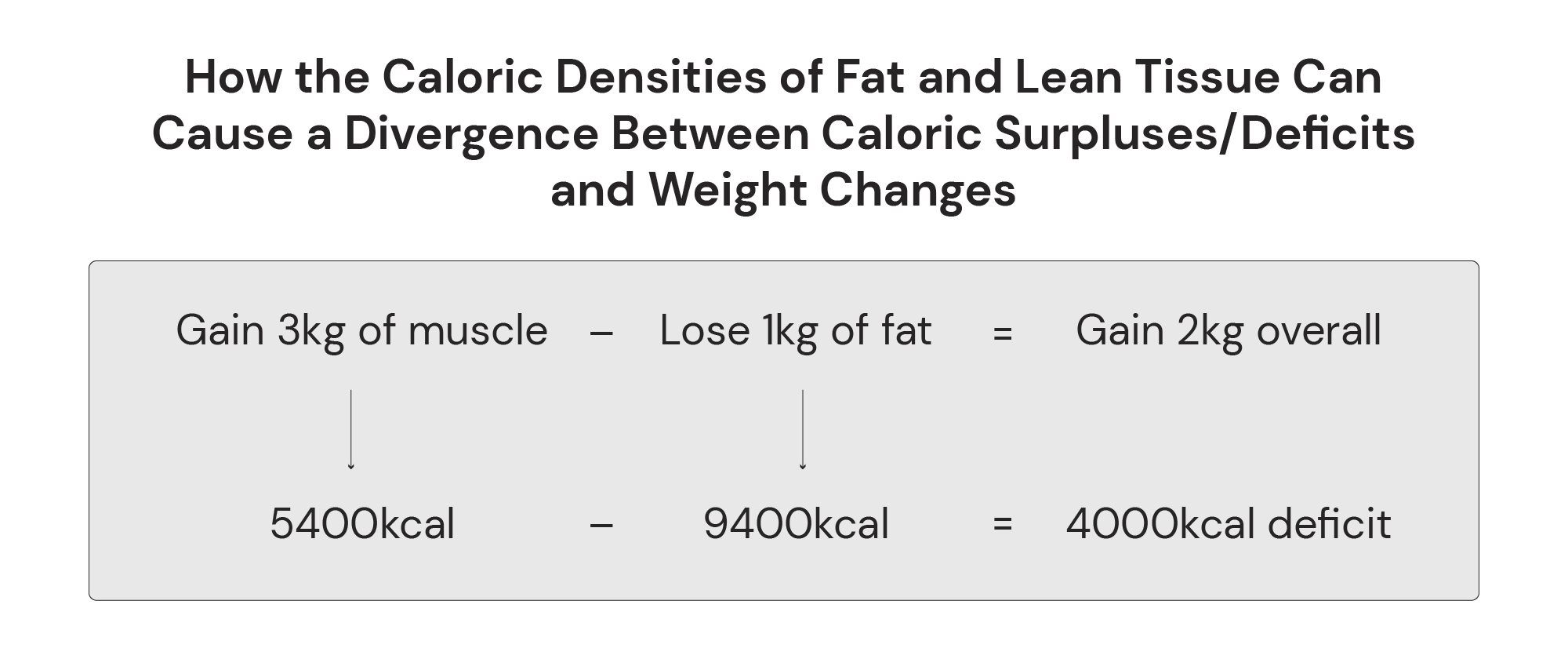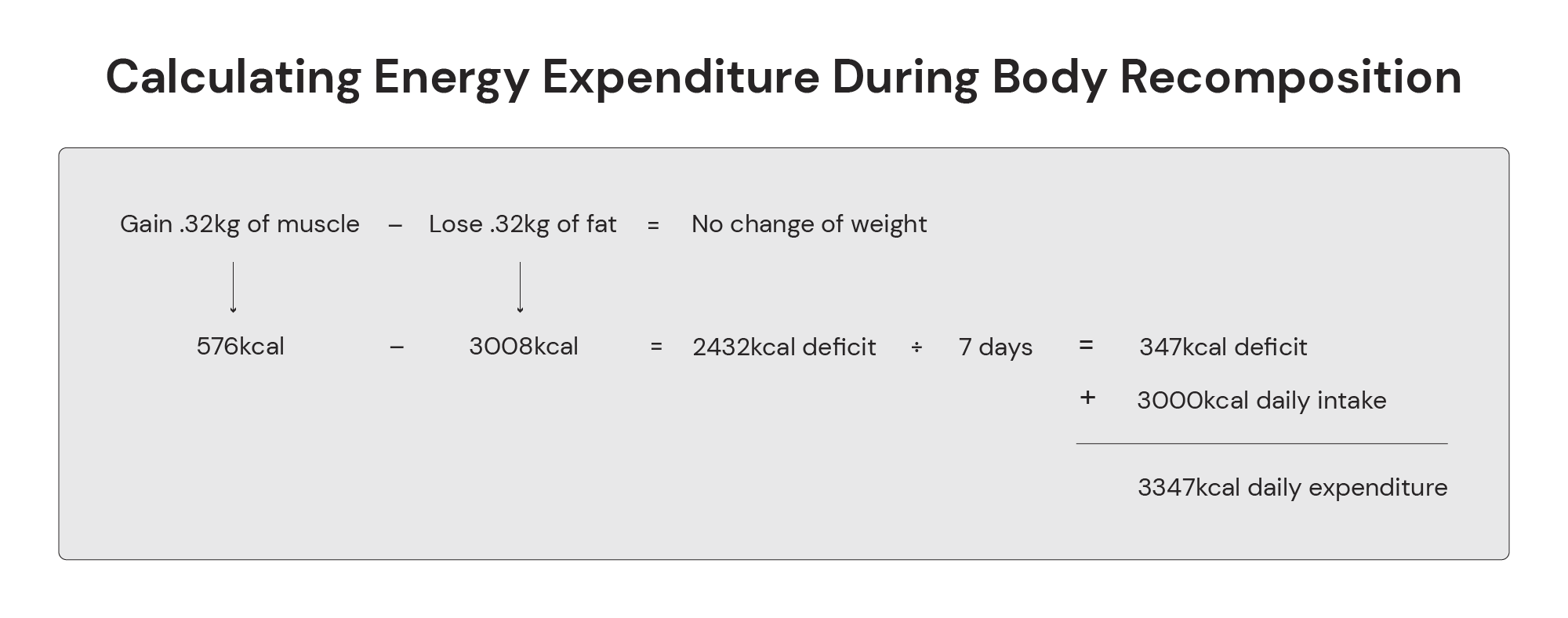Since MacroFactor doesn’t use day-to-day body composition estimates for program adjustments, some users may wonder how MacroFactor handles periods of body recomposition when a user is simultaneously losing fat and gaining muscle.
Fat tissue is more energetically dense than lean tissue – lean tissue stores about 1800 kcal per kilogram, while fat tissue stores about 9400 kcal per kilogram, on average. So, in theory, you could be in a non-trivial energy deficit without a change in weight if you were simultaneously losing fat and gaining muscle. This principle also applies in reverse – if you lost a kilogram of muscle while gaining a kilogram of fat, that would represent a net surplus of approximately 7600 kcal without a change in total body weight.

So, how would body recomposition affect your energy expenditure estimate and nutrition recommendations in MacroFactor?
I’ll illustrate using an uncharitable scenario of considerably better-than-average body recomposition. In other words, this scenario would essentially be the worst-case scenario for MacroFactor’s algorithms, and represent a practical upper limit on the degree to which body recomposition could “confuse” MacroFactor’s estimate of your total daily energy expenditure.
Over about 10 weeks of resistance training, untrained men gain about 1.6kg of lean body mass, on average. For this scenario, we’ll assume that an individual is gaining lean mass at twice that rate – 3.2kg of lean mass over 10 weeks. Typically, such a gain in lean body mass would accompany a gain in total body mass, but we’ll assume that this individual is not only gaining lean mass at twice the typical rate; they’re also fully recomping. Thus, they don’t gain any weight at all, but they lose 3.2kg of fat mass over 10 weeks. This is truly a pie-in-the-sky dream scenario for virtually anybody who’s trying to lose fat and gain muscle – an extreme amount of body recomposition, in a relatively short period of time. Finally, although it’s not too important for this particular illustration, we’ll assume that this individual is consuming 3000kcal per day.
In this scenario, MacroFactor would see that this individual is consuming 3000 calories per day, and not experiencing any change in body mass. Therefore, their estimated energy expenditure would be 3000 calories per day. Simple enough.
However, we know that MacroFactor’s estimate of this individual’s energy expenditure is incorrect – since they’re losing (calorically dense) fat tissue and gaining (less calorically dense) lean mass at the same rate, they must be in a net energy deficit. In other words, we know that they’re expending more than 3000 calories per day.
We can calculate this individual’s weekly energy deficit easily enough. They’re gaining 0.32kg of lean mass per week, and losing 0.32kg of fat mass per week. Gaining 0.32kg of lean mass means this individual is storing a net of 576 calories per week (0.32kg × 1800kcal/kg) in their newly synthesized lean tissue, and expending a net of 3008 calories (0.32kg × 9400kcal/kg) from their catabolized fat tissue. Thus, each week, they’re in a net caloric deficit of 3008 – 576 = 2432kcal. A weekly deficit of 2432kcal represents a daily deficit of about 347 calories. Therefore, this individual’s actual energy expenditure would be 3347kcal/day (not 3000kcal/day).

To put things in perspective, that magnitude of error (347 calories per day, or approximately 10%) represents an extreme edge case. With a more typical rate of body recomposition – for example, gaining 1kg of lean mass while losing 1kg of fat over 10 weeks – the error would only be about 108 calories per day (or about 3.5%). Furthermore, this worst-case scenario for the accuracy of MacroFactor’s algorithms still compares favorably to other methods someone might use for estimating their daily energy expenditure. Wearable devices under- or over-estimate total energy expenditure by more than 10% around 82% of the time, and static equations used to estimate total daily energy expenditure have an average error of ~325 calories per day.
Thankfully, this inaccuracy doesn’t actually have a negative impact for anyone pursuing a weight-related goal – or even a goal related to body recomposition – when using MacroFactor.
For example, if someone is aiming to lose a pound per week (which typically requires someone to consume about 500 fewer calories per day than their maintenance intake), it makes the most sense to calculate their calorie intake targets based on the level of calorie intake that results in weight maintenance, rather than the individual’s “true” total daily energy expenditure.
In the scenario above, a daily caloric intake of about 2500 calories would result in about a pound of weight loss per week, based on the fact that an intake of 3000 calories per day results in weight maintenance. If we used an energy expenditure figure of 3347 calories per day to recommend a calorie intake target for losing a pound per week, the resulting intake target – 2847 calories per day – would almost certainly be too high for the user to lose weight at their desired rate.
Similarly, if someone is specifically aiming for body recomposition – targeting weight maintenance, a very slow rate of weight gain, or a very slow rate of weight loss to simultaneously gain muscle and lose fat – baking in the energy expenditure estimation “error” resulting from body recomposition is actually preferable when calculating energy intake targets.
In the scenario above, the user was simultaneously building muscle and losing fat while consuming 3000 calories per day. If they want to keep gaining muscle and losing fat while maintaining their current body weight … they should keep eating 3000 calories per day. In other words, the expenditure estimation error is the result of body recomposition. There’s no need to correct that error, because the energy expenditure estimation error is the outcome of achieving your desired body recomposition, and the result of the fact that your current intake targets are completely appropriate for your goals. The old adage “don’t fix what isn’t broken” perfectly describes this situation.
So, long story short: body recomposition can lead MacroFactor to (slightly) underestimate your energy expenditure. But, those errors don’t negatively impact MacroFactor’s ability to generate nutrition recommendations that are appropriate for your goals.
Now that you understand how MacroFactor's algorithms respond to body recomposition, you might enjoy one of these articles next: